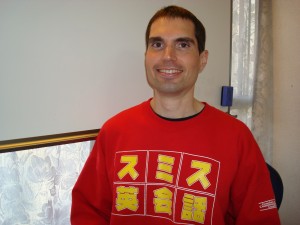 One of the things that I enjoy being able to do for my students at Smith’s School of English Tsukaguchi (スミス英会話塚口校) is teaching them proper English pronunciation (英語の発音). I have earlier written some posts on this subject, including Showing students how to pronounce English properly 正しい発音の仕方 -ある日のレッスン- and Showing students how to pronounce English properly 2.
One of the things that I enjoy being able to do for my students at Smith’s School of English Tsukaguchi (スミス英会話塚口校) is teaching them proper English pronunciation (英語の発音). I have earlier written some posts on this subject, including Showing students how to pronounce English properly 正しい発音の仕方 -ある日のレッスン- and Showing students how to pronounce English properly 2.
Yesterday, a student asked me how to pronounce some English words, which she had written down on paper. I happily taught her the pronunciation of the words. Then under the English words, she wrote what she heard me say in katakana. Oh no! I told her that using katakana to learn English pronunciation wasn’t good because the pronunciations of the words in English and katagana are different. I recommended that she refrain from writing katakana below English words. She understood and I hope that she succeeds in stopping that habit. This student works hard and even does some self-study at home. I applaud her on her effort to improve her English. She’s a a great student! Learning proper pronunciation will only make her English better.
So what is the best way for this student and all Smith’s students to learn proper pronunciation when studying English conversation (英会話)? By asking their Smith’s teacher, of course! (^.^) Now I understand that some students may be tempted to write katakana under English words after hearing their Smith’s teacher pronounce the words, not to forget the pronunciations. However they must not do this. If they do, they’ll go home, study the katakana that they wrote and learn that. A lot of this could lead them to speaking “katakana English”, strange-sounding English. Nobody wants that! I’d like students to speak real-sounding English, as close as possible to that spoken by native speakers. That requires learning proper pronunciation. A Smith’s teacher can teach them that.
As for the problem of forgetting the pronunciation of taught words after their lesson, I suggest that students bring some kind of recording device to class (cassette tape or digital) and record (with permission) their teacher pronouncing the words. Later they can listen to it at home or anywhere and practice repeating the words over and over again until they think they’ve got it right. Then at their next Smith’s lesson, they should check with their Smith’s teacher to see if their pronunciation is correct. If it’s not, their teacher can correct them and they can practice some more until one day, they get it right and make it their own!
Learning proper English pronunciation may not be so easy, but it is very much worth the effort for English conversation (英会話) students. Their English will sound more natural and be more understandable to others. I wish them all the best of luck! They can do it! (^.^)
Derek
Smith’s School of English Tsukaguchi
月謝制英会話のスミス英会話塚口校
http://www.smithweb.co.jp/school/tsukaguchi.shtml
尼崎市の英会話英会話スクール
Derek,
So true! Katakana is very convenient when used in the Japanese language to write foreign names and words. But what must be learned by students is that Katakana pronunciation is far from the correct pronunciation in most cases and they should not use it when speaking English. The biggest problem is that it unnecessarily adds many vowel sounds to each word. This is due to the syllabic nature of Japanese vs. English where words are combinations of individual sounds represented by the letters of the alphabet. Actually, somewhere along the way, students need to learn to actually pronounce the sounds of each letter. Amazingly they seem to rarely do this during the 6 years they study English in secondary school in Japan. But English has some peculiarities too. Take for example the fact that the past tense forms of many words end with ‘ed’ but the ‘d’ is pronounced more like ‘t’. For example ‘asked’ and ‘washed’. Now, how are students supposed to realize that the ‘d’ is pronunced as a ‘t’?
Thanks Al. That’s true. Students need to have those peculiarities pointed out to them by their Smith’s teachers.